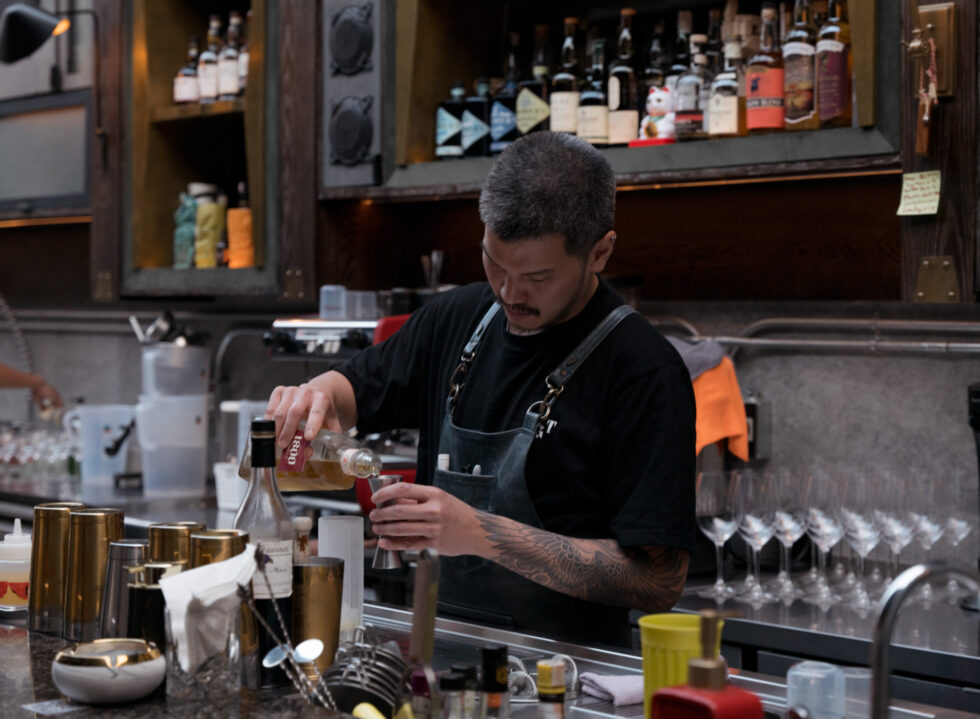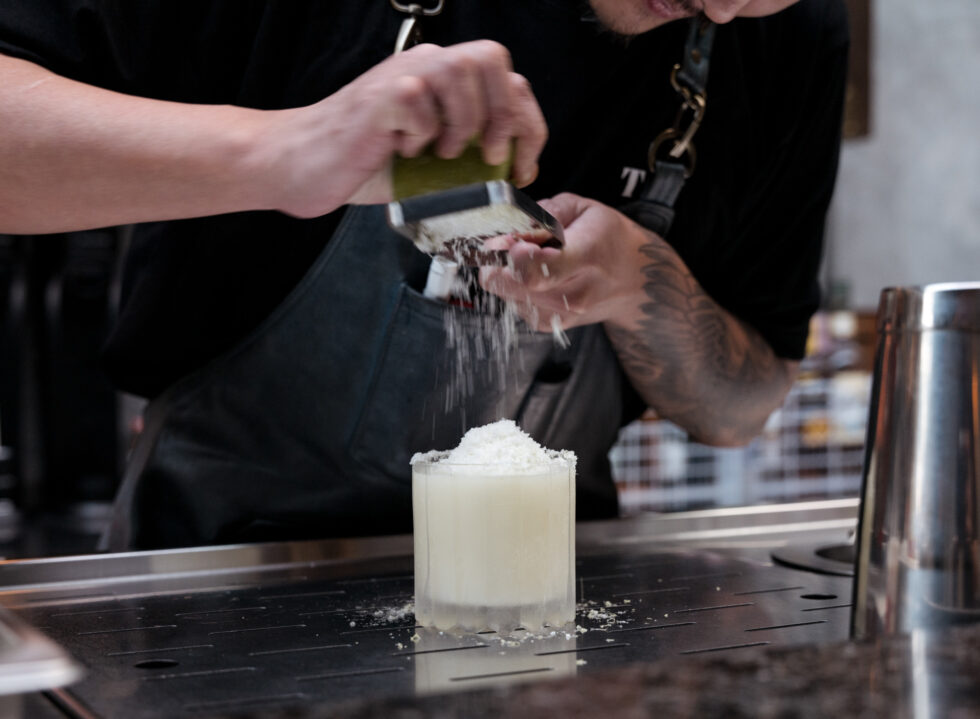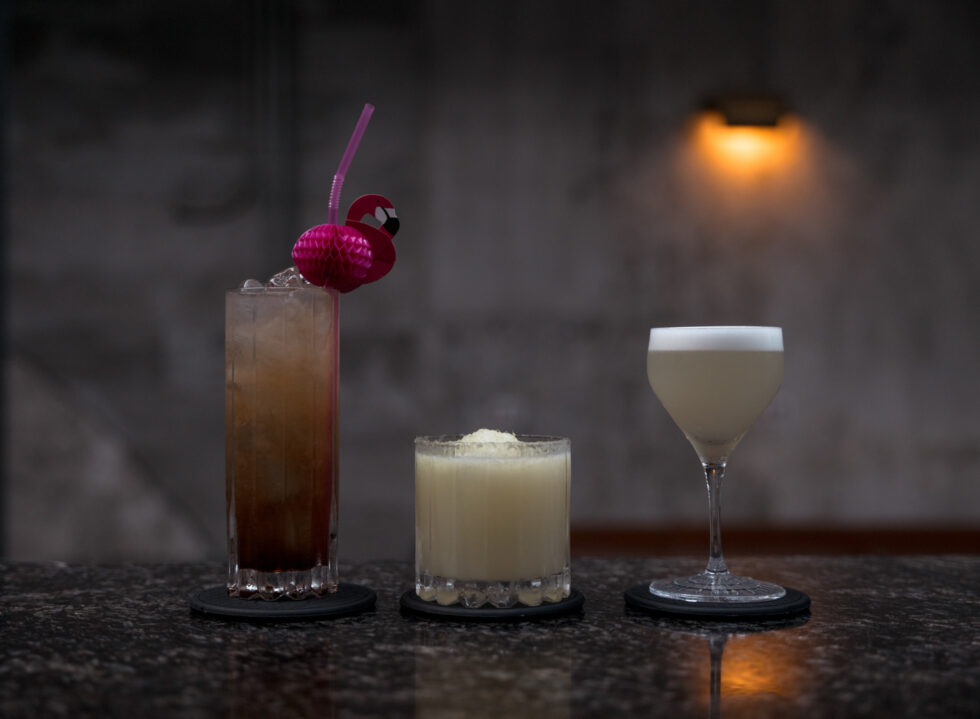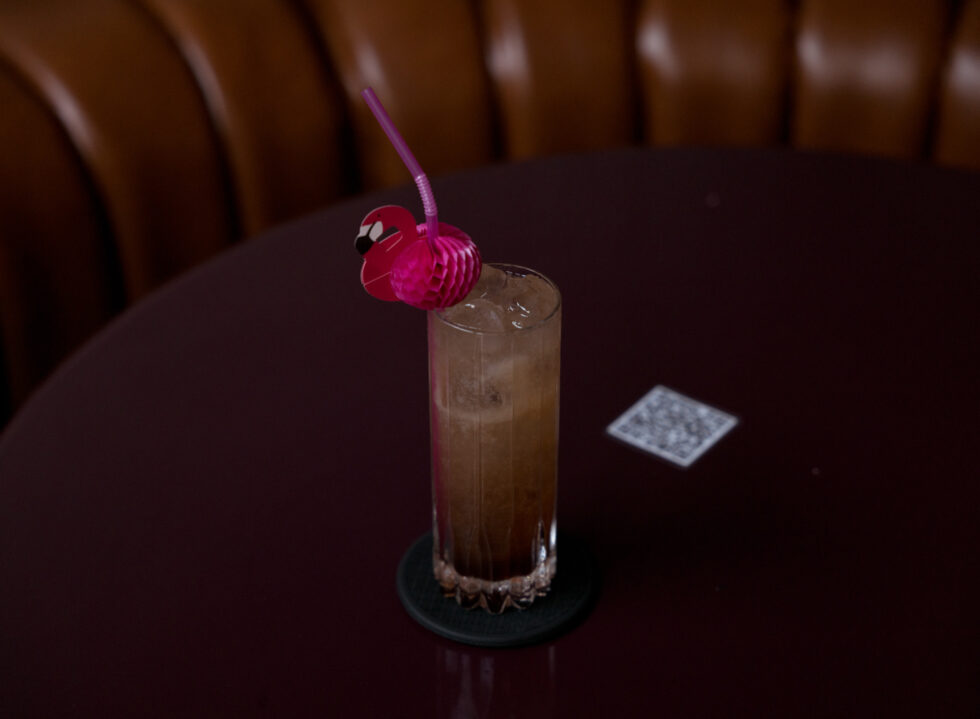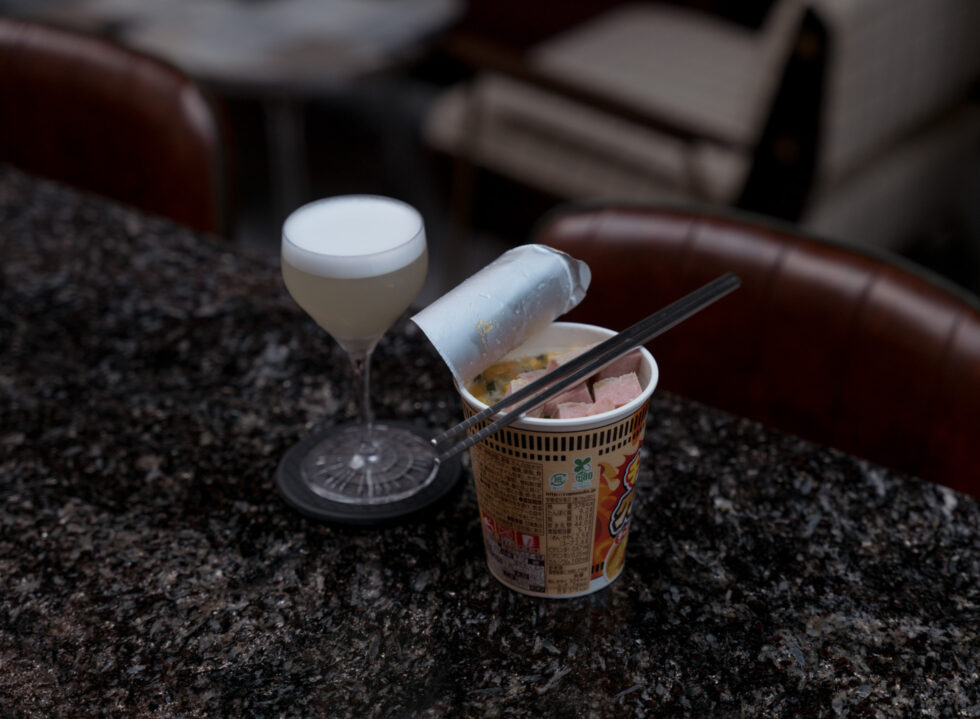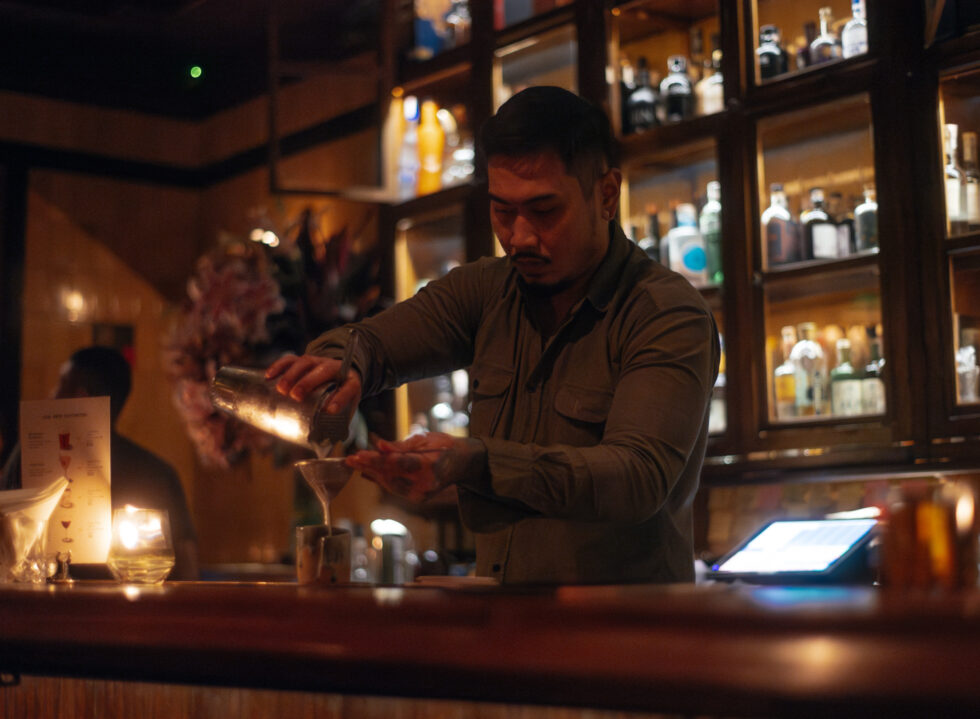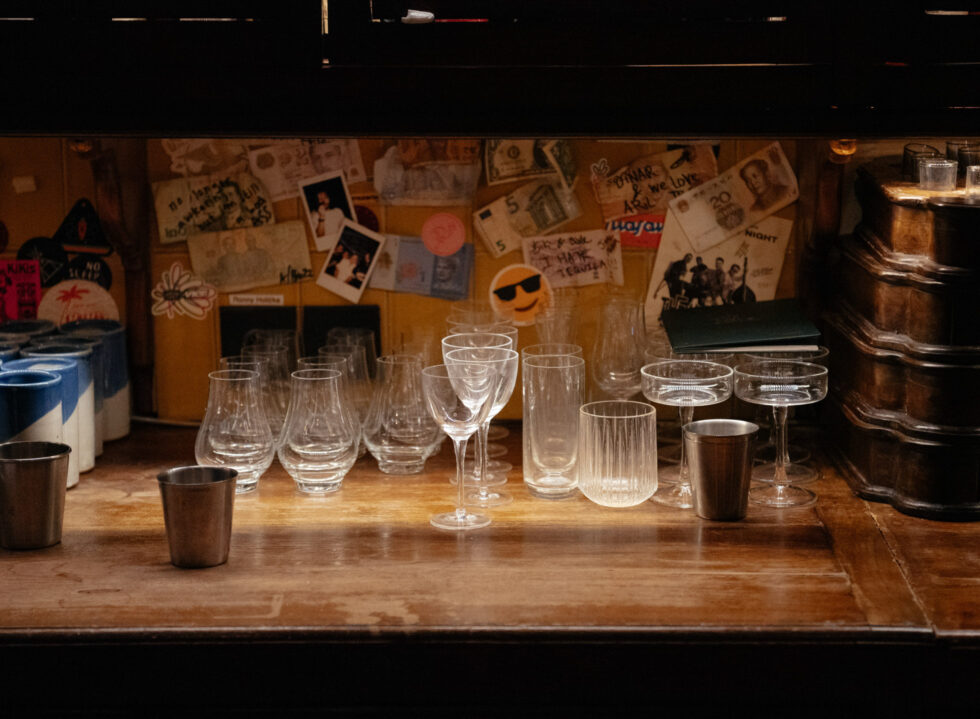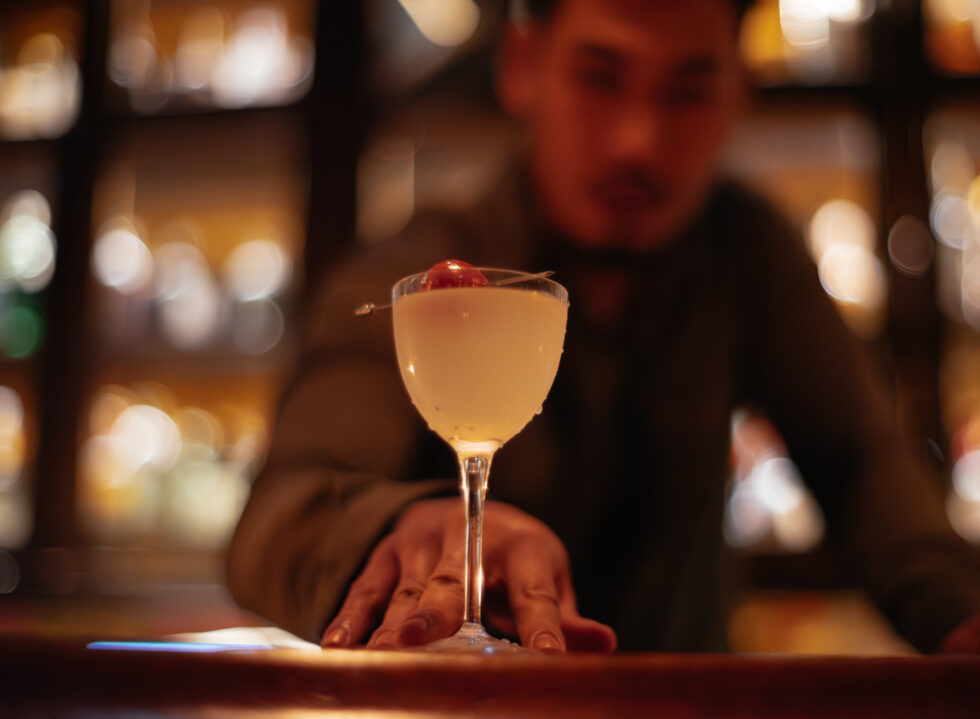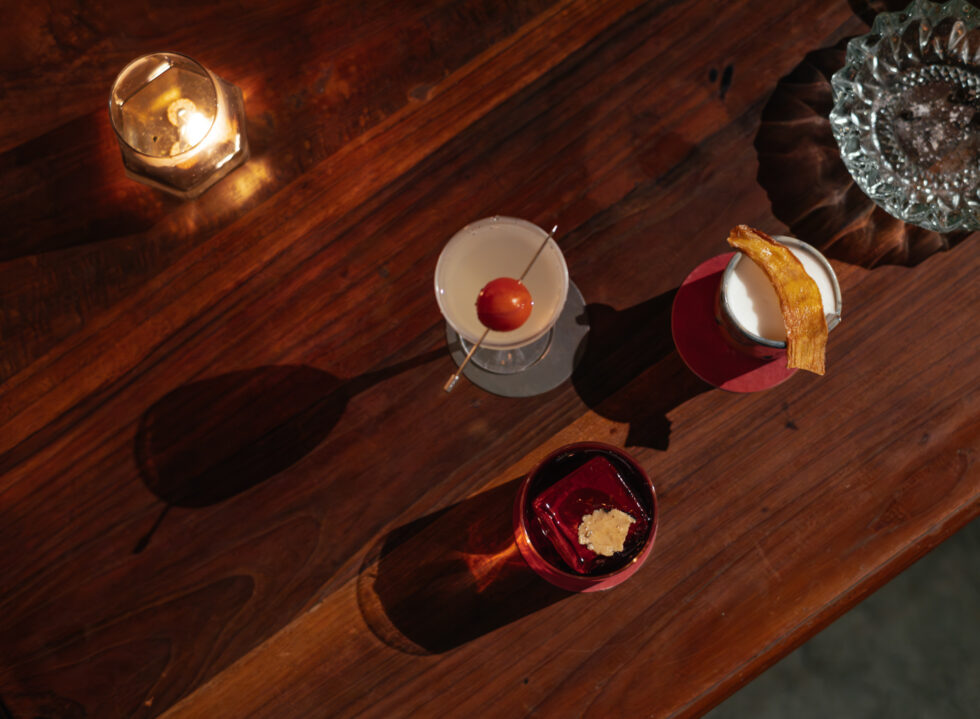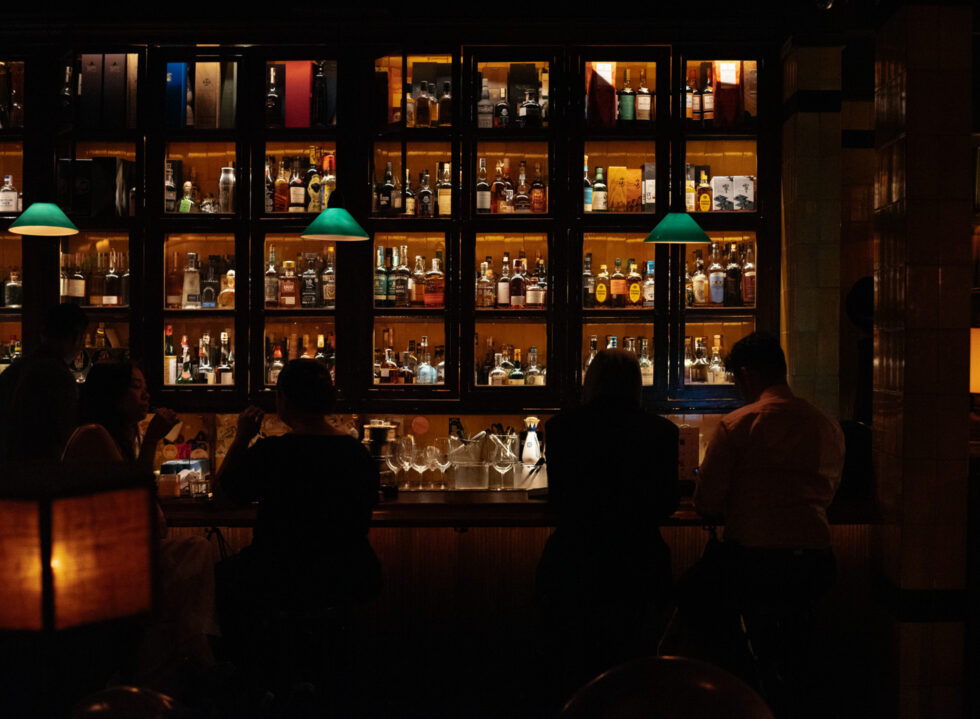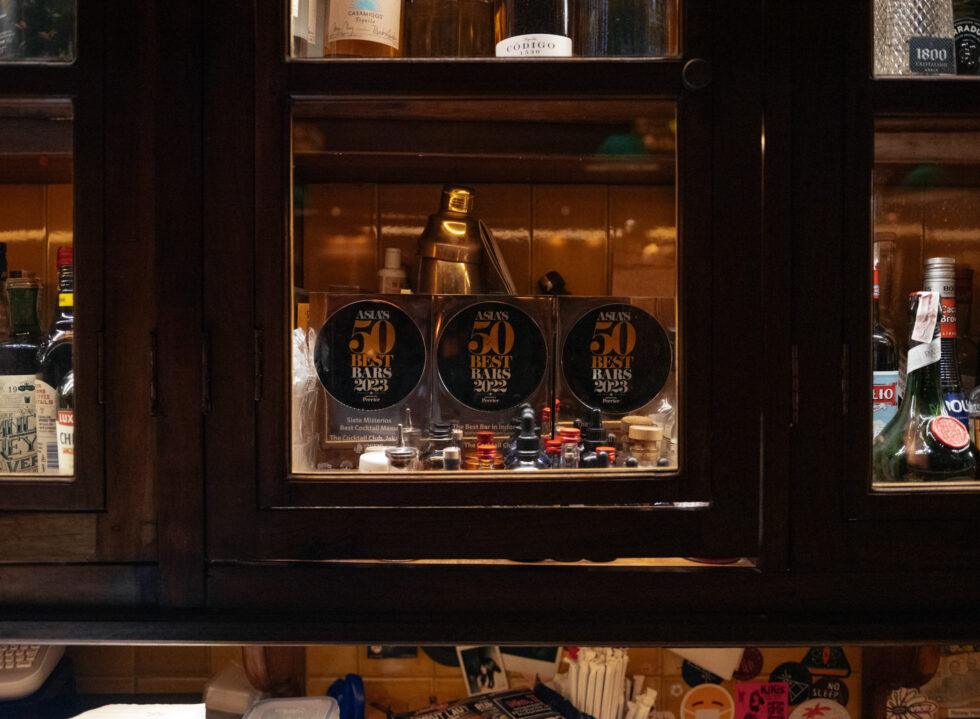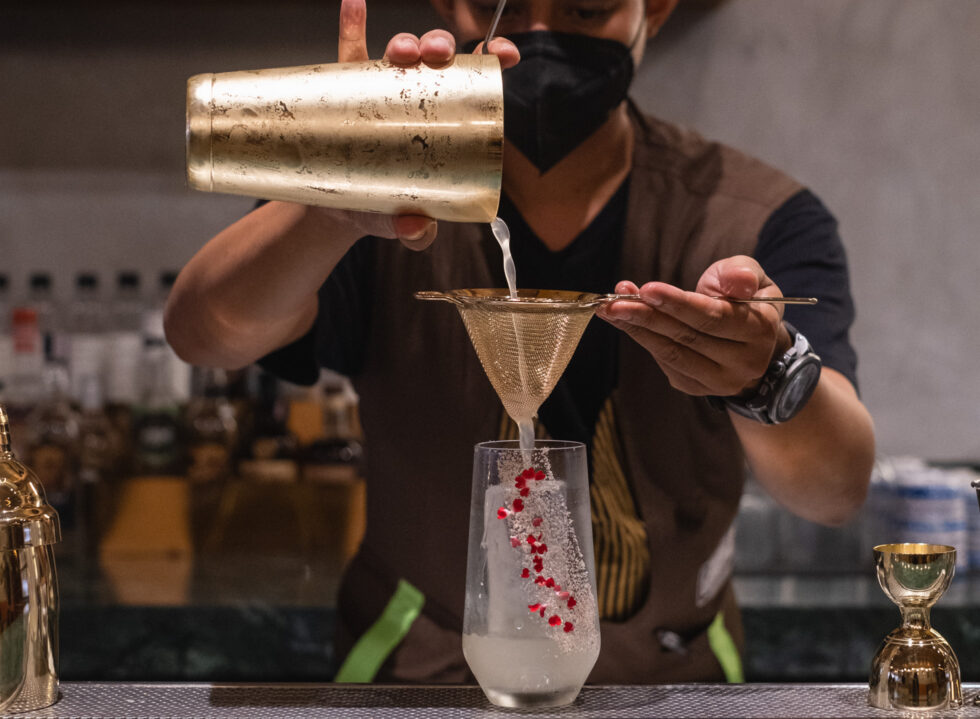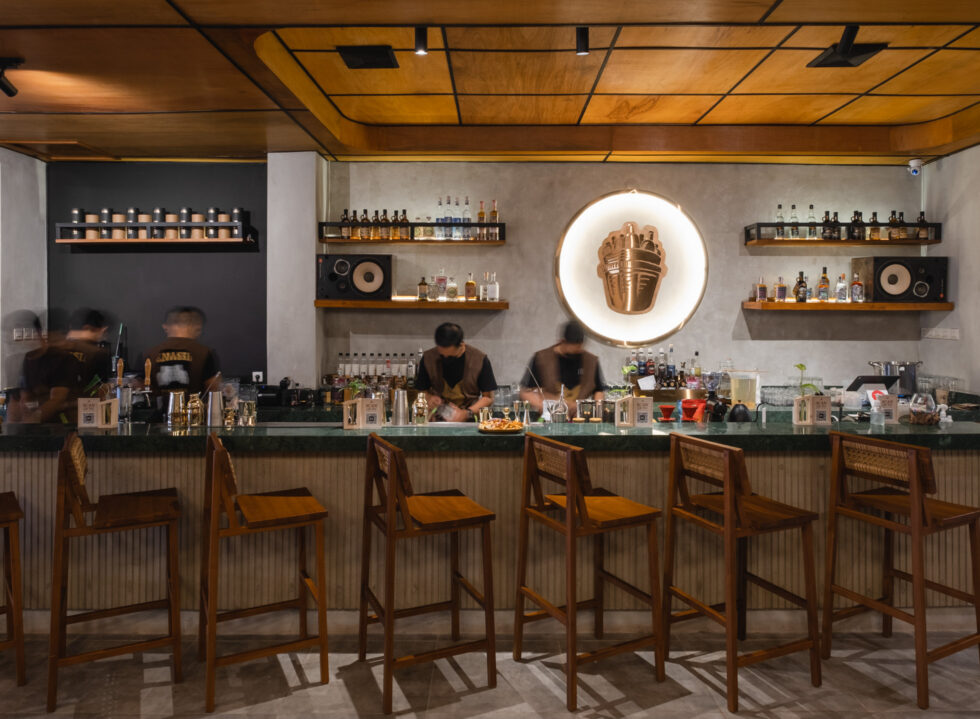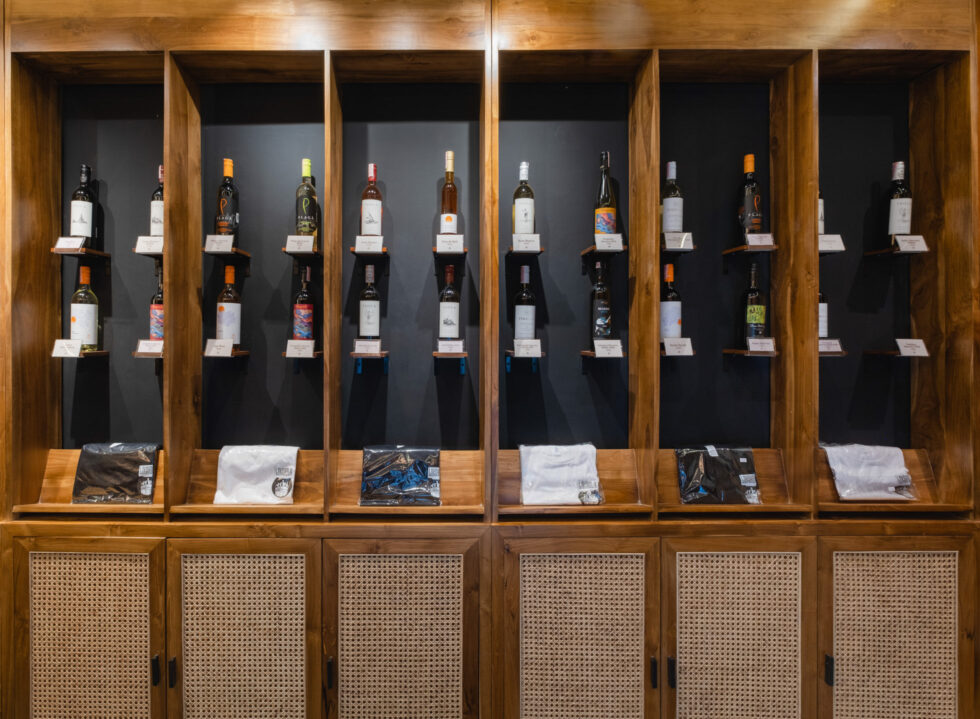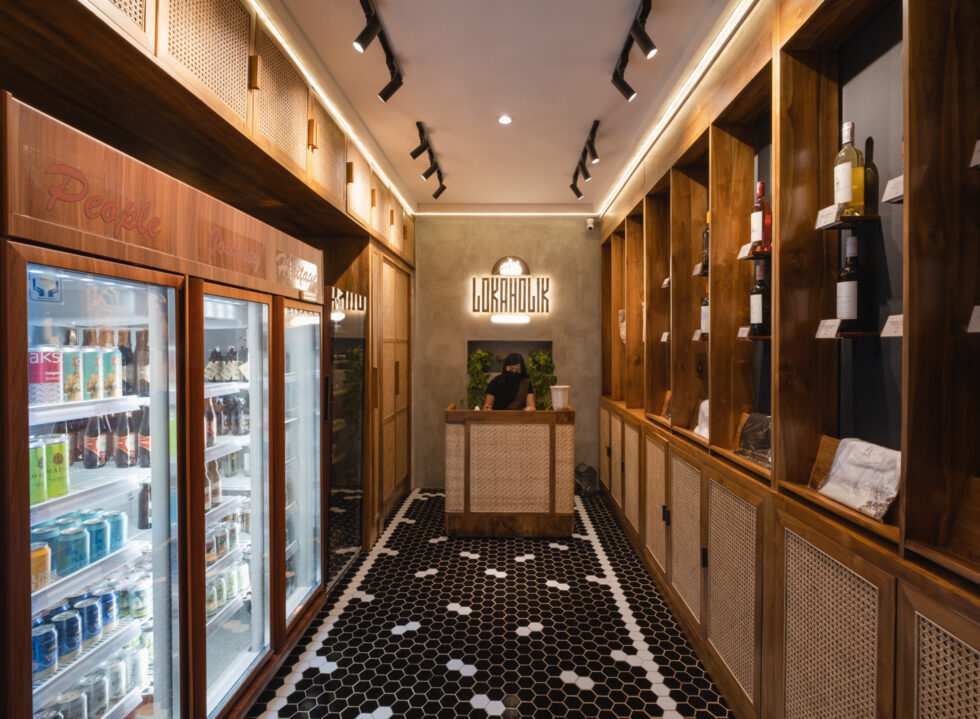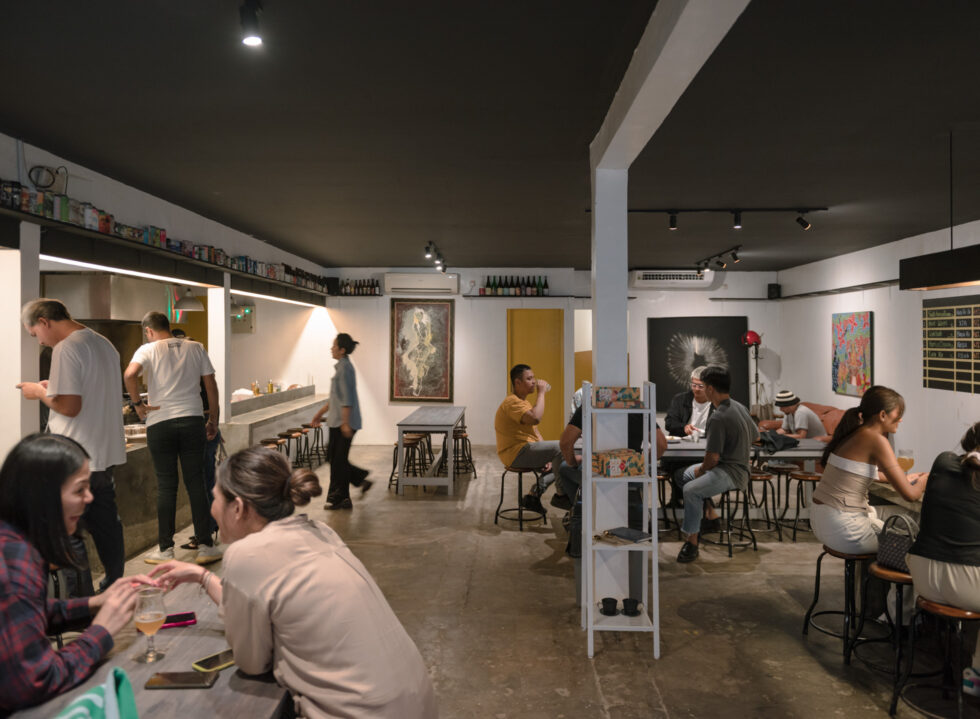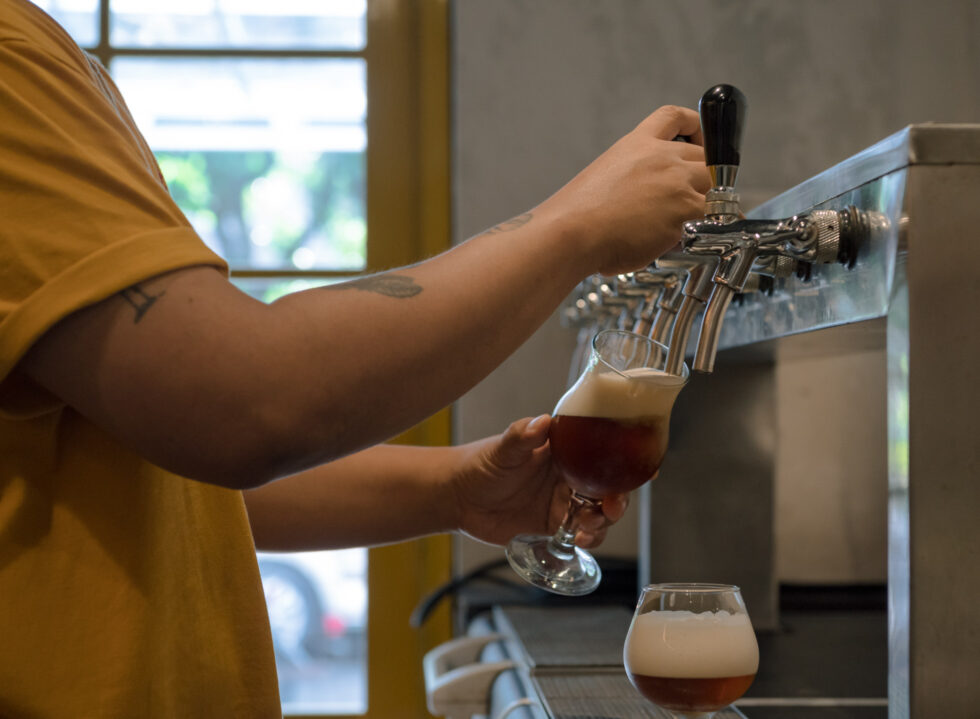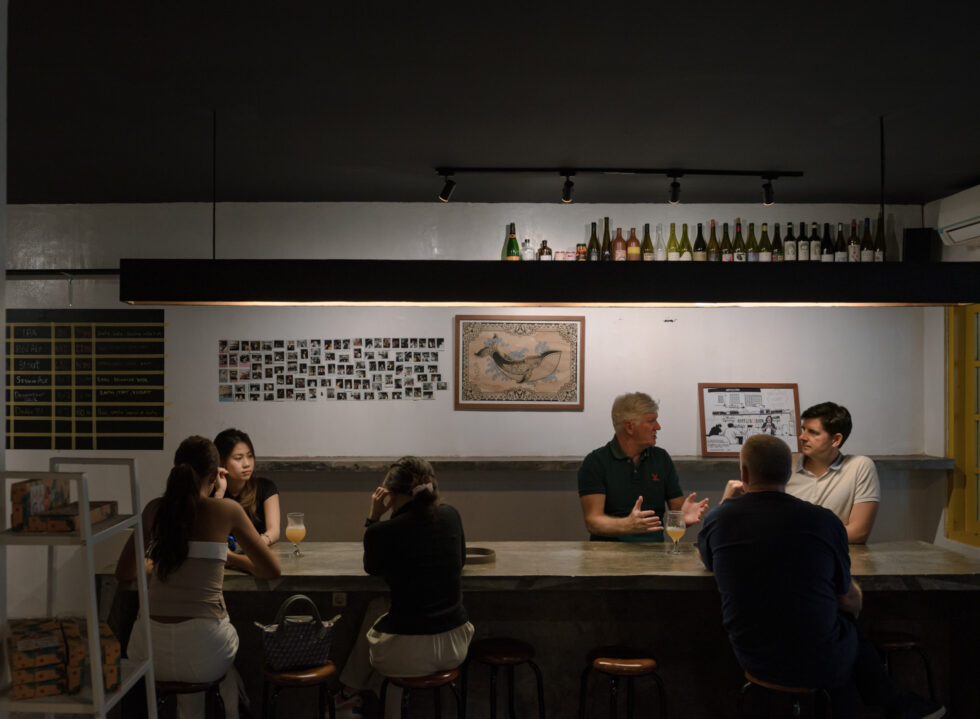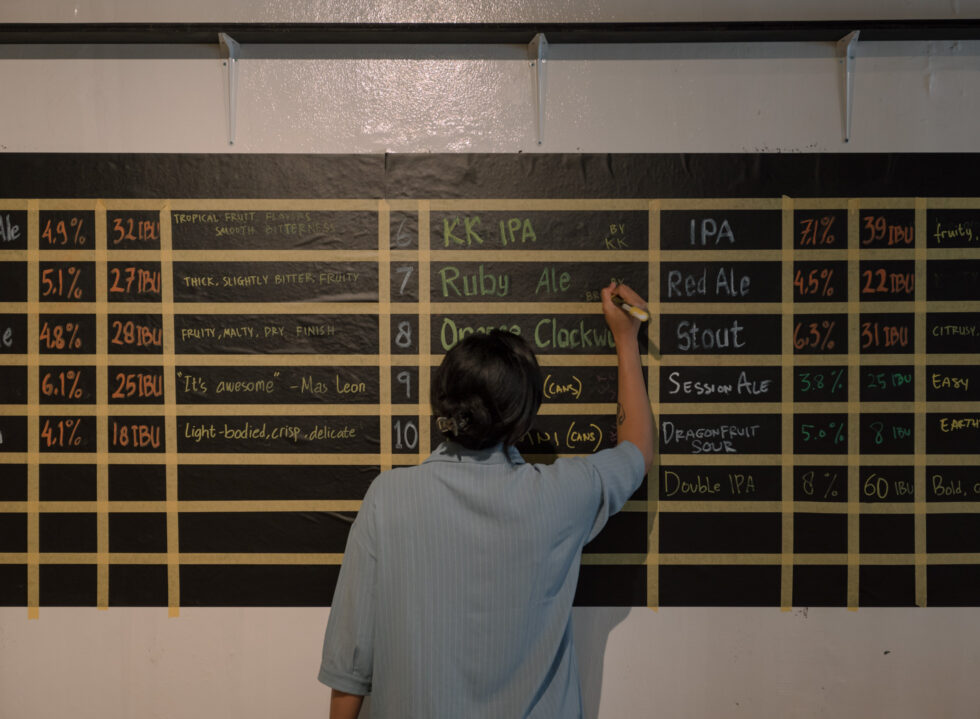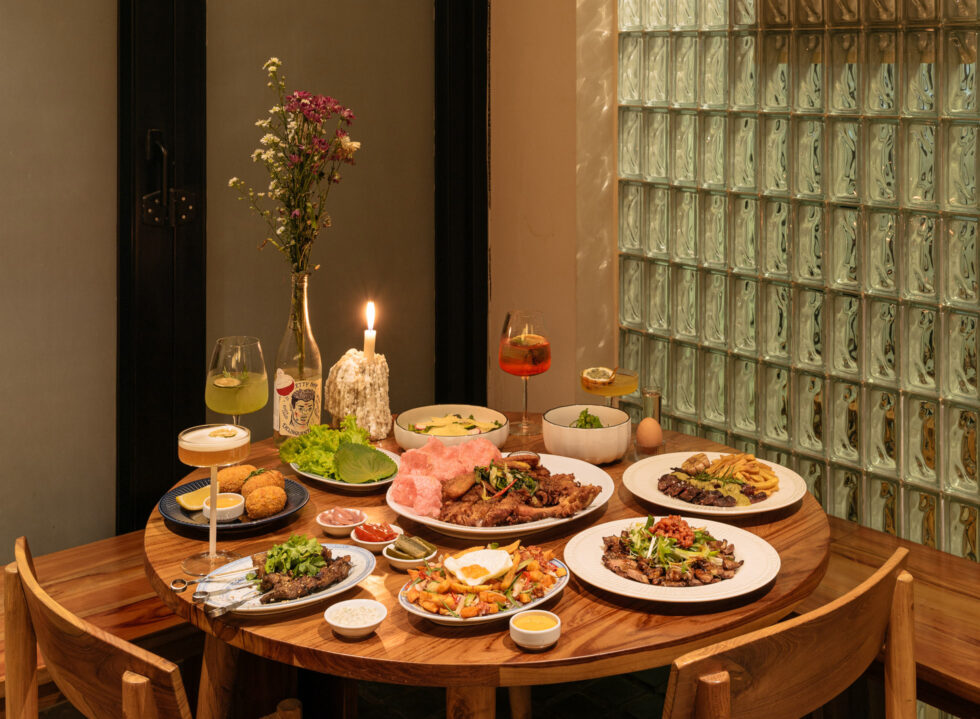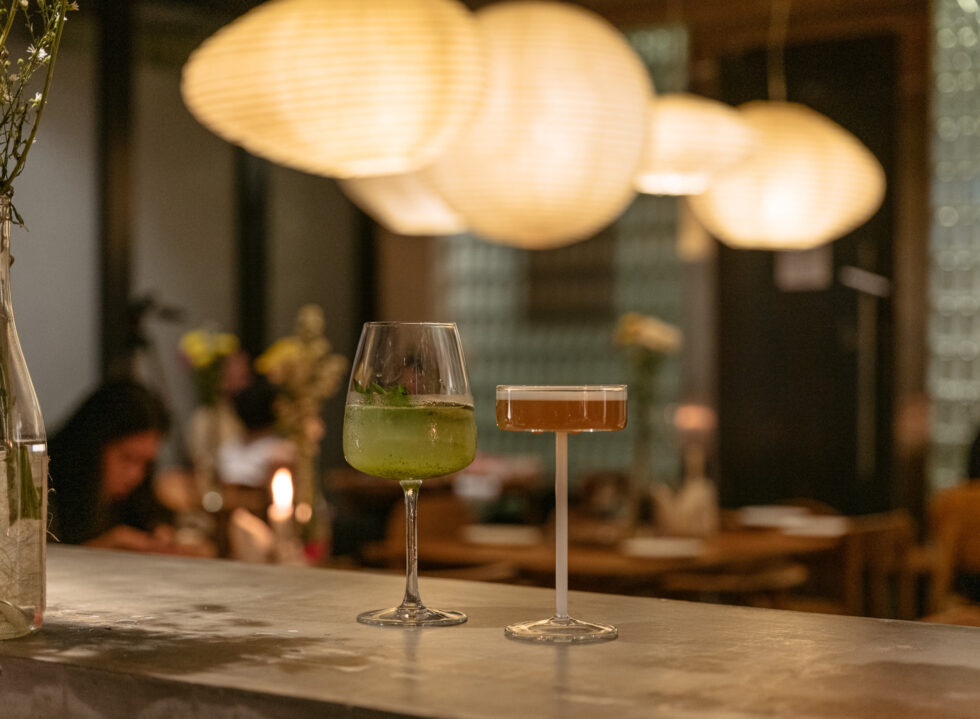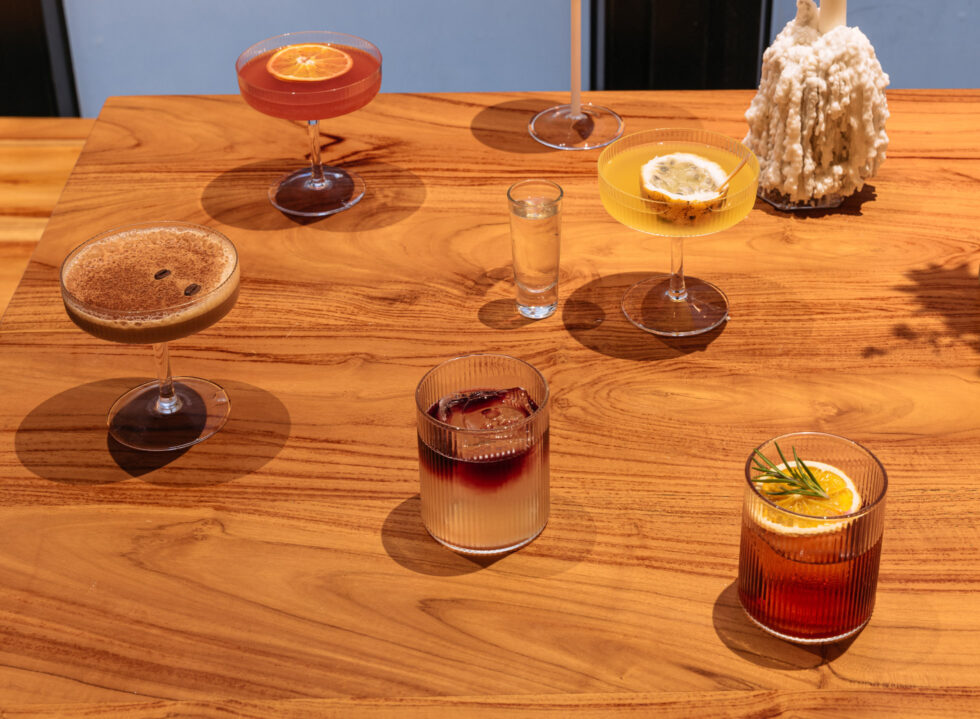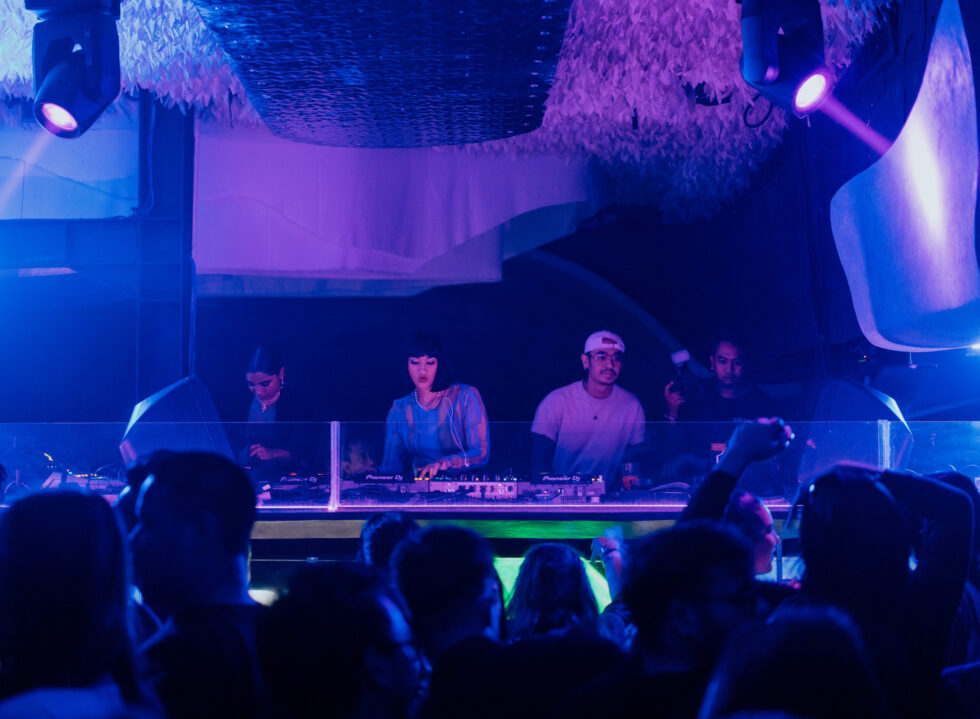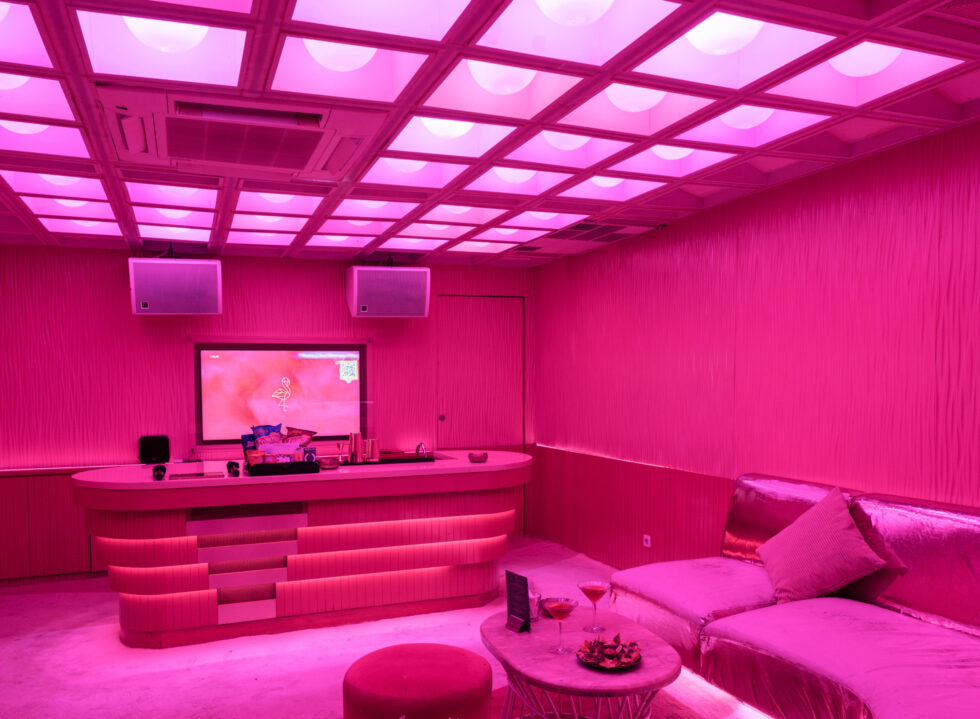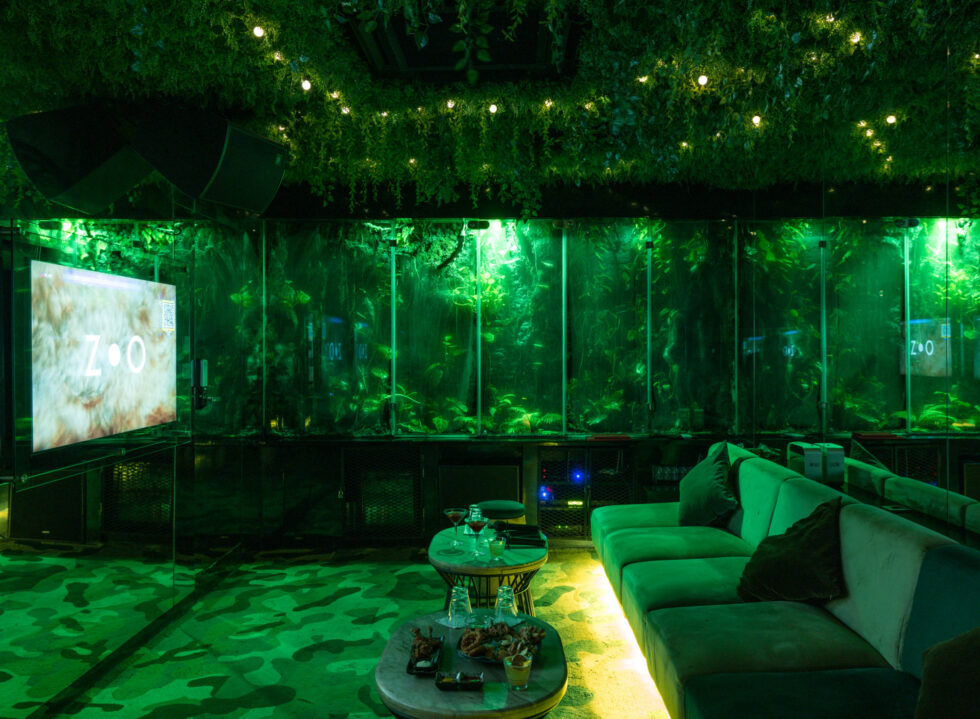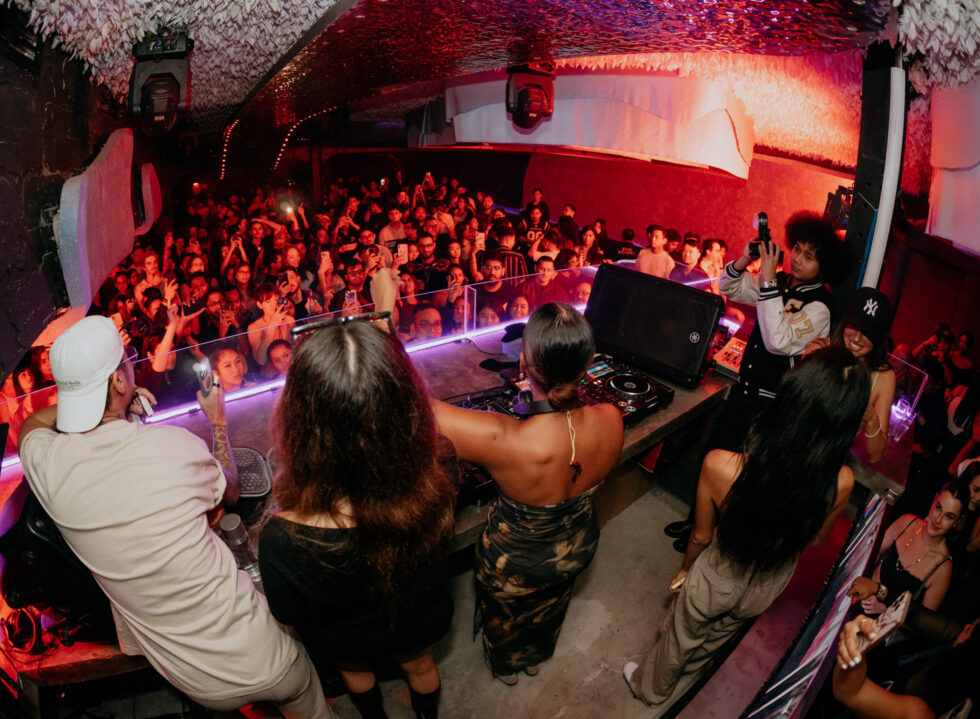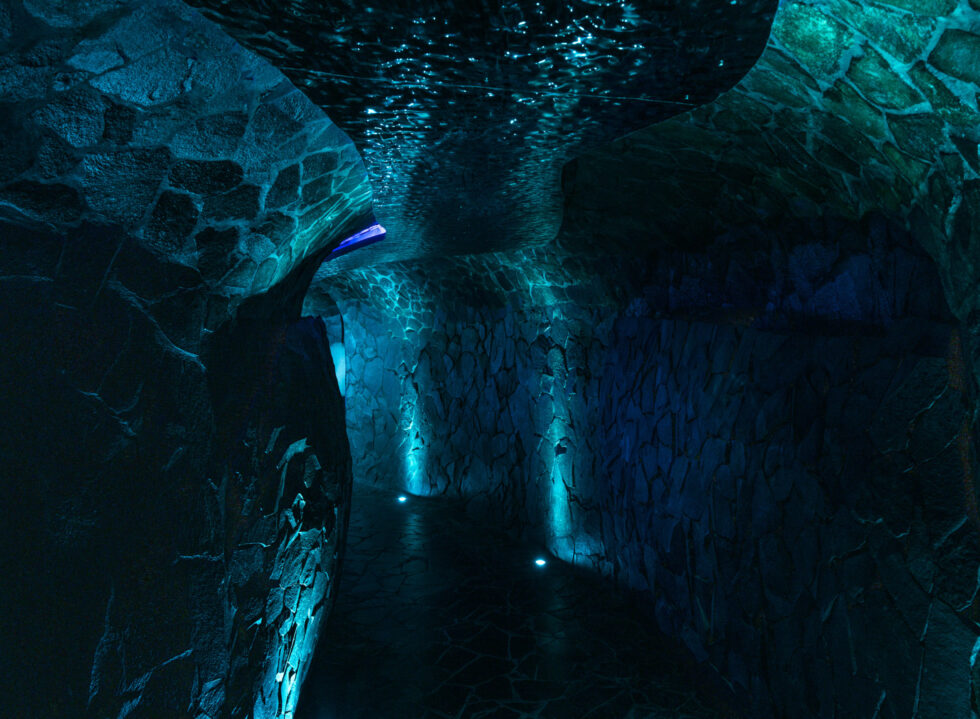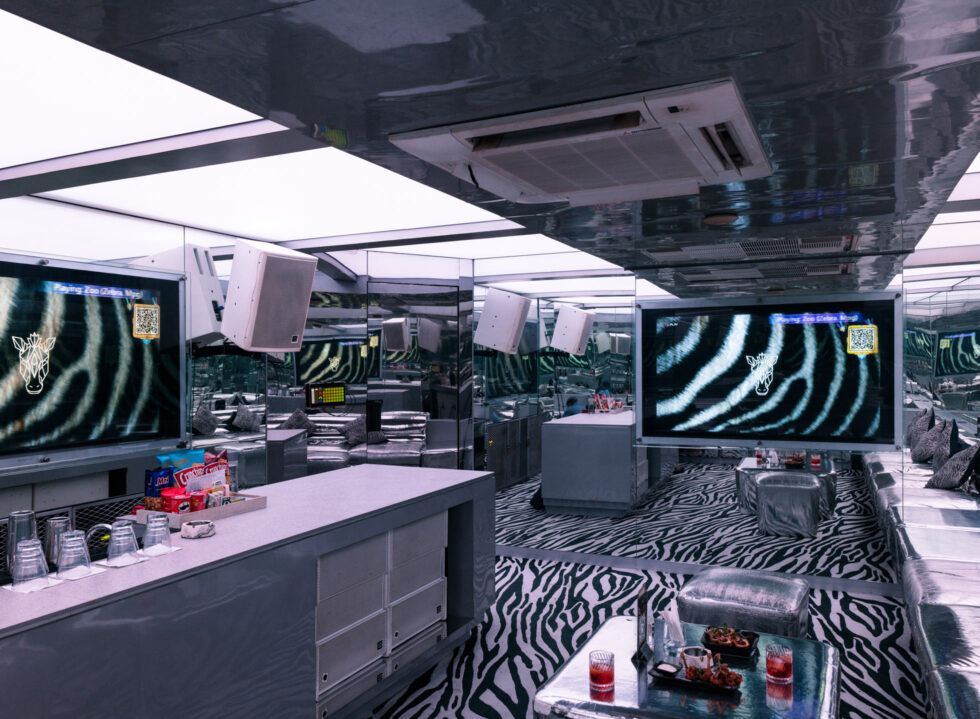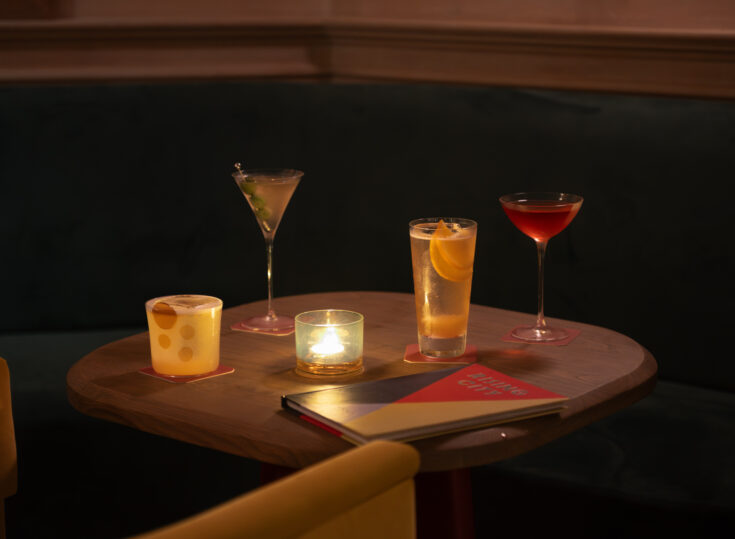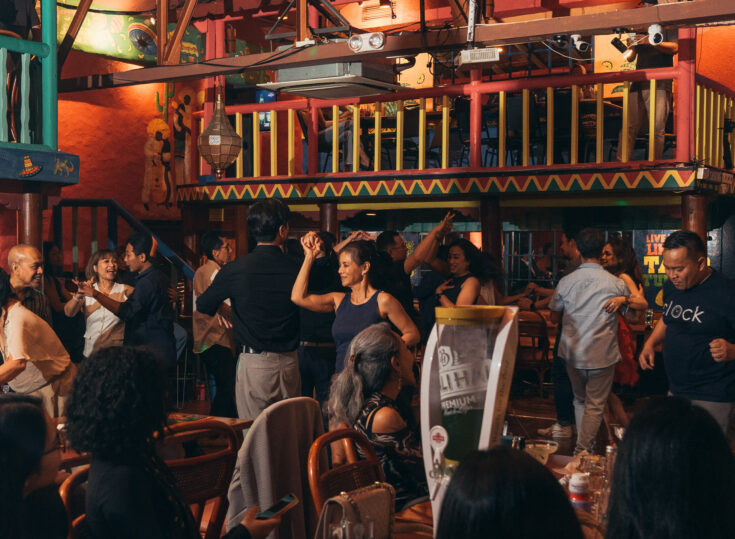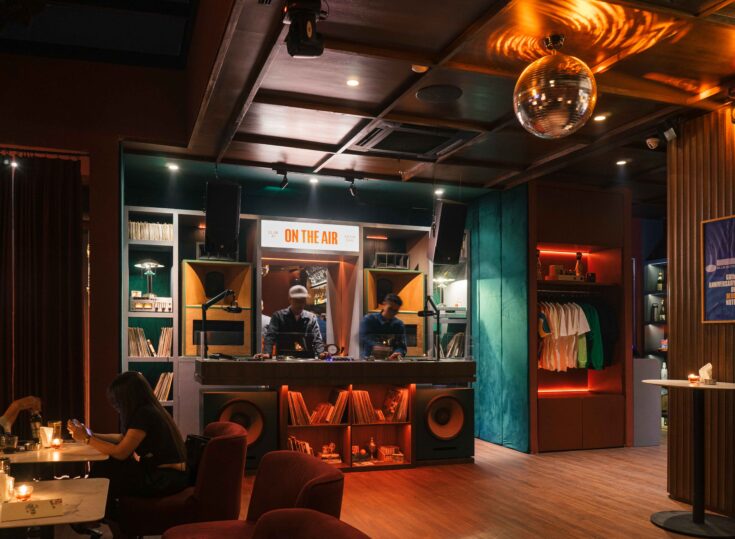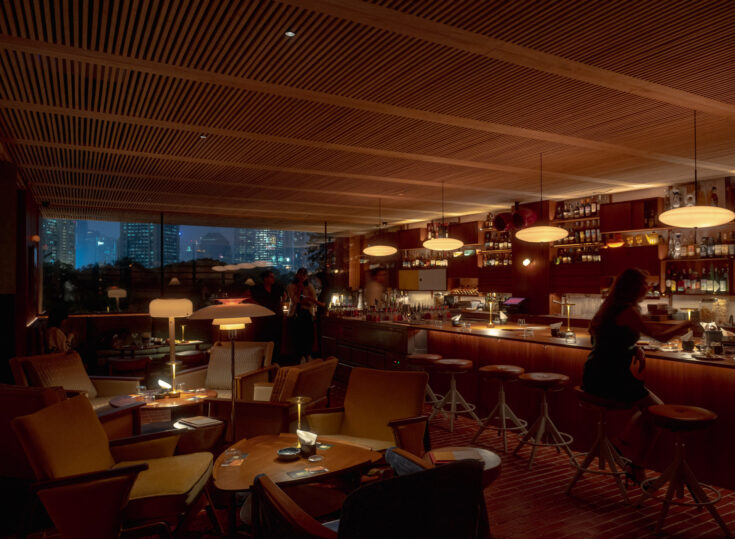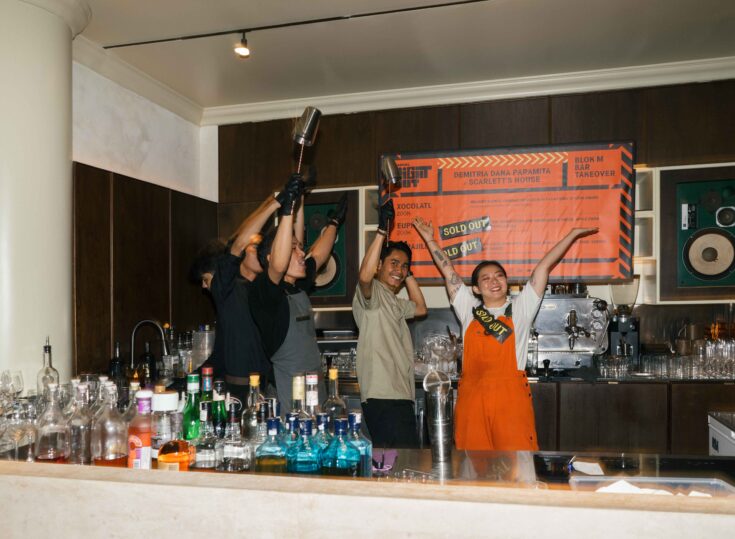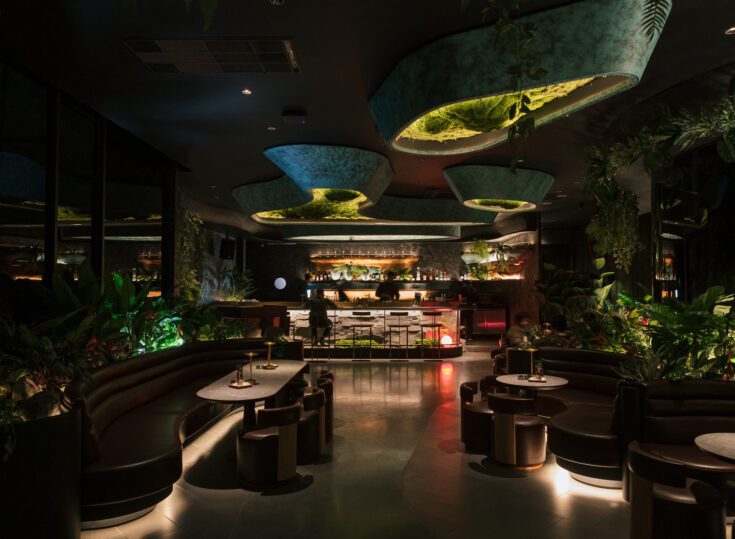The Golden Tooth’s loft on Adityawarman Street darkens with the day, smoothly easing into the night as the sun disappears from the skylight above. Chatters between the hideaway bar‘s patrons hum between the crunching of ice cubes and the tinkle of liqueurs being mixed and poured into glasses short and tall—sometimes accompanied by a flamingo straw that gives the drink a bit of pizazz.
Co-founder and head bartender Kenny Soetomo is the man behind the bar, an experienced cocktail whiz with a low tolerance for alcohol yet high enthusiasm for exploring the many ways one can bring out and combine the flavours of the spirits. “What draws me to cocktails is the sheer joy of creating them,” he said. “Personally, my motivation stems from the approval and affirmation of our guests when they savour our drinks. The social aspect of cocktails, where they bring people together and forge connections, certainly adds to the allure.”
Casual and uninterested in typical bar decorums, The Golden Tooth is a stomping ground for fellow cocktail enthusiasts in the city with whom Kenny often bonds with. Regulars casually slurp cup noodles that the bar has in stow while savouring bespoke cocktails such as the Daisy #2, a fruity and zesty dessert cocktail that uniquely incorporates shaved frozen apple ‘kakigori‘ as garnish. And if they’re lucky, Kenny might just order a complementary pizza to keep them company. “What I realised is that I’m not just giving them cocktails, but also the space and the time we can hang out together.”
The bar is one of the recent establishments that have given a new burst of character to the nightlife scene following the pandemic, a period during which the industry experienced a steep downturn where half of the existing establishments (covering clubs, bars as well as karaoke and live music spots) had to close permanently by 2021. It put a halt to the exciting nightlife revival in 2019 that saw new players setting ground in the city with their own offbeat formulas. But the presence of The Golden Tooth should tell us that it hasn’t exactly gone away. Instead, today’s lifestyle players are finding new ways to broaden the definition of what a night out should look like beyond the promise of a lively party.
A newfound appreciation for cocktails
A regular at The Golden Tooth, restaurateur Banjo Tasning (known for his projects PÒ Noodle Bar, PÒ SupperKlab and Iron Fist) attested that now, “we have more options for a night out. Whether you’re looking for a spot for pre-drinks, wine, craft beer, cocktails, a nightcap or maybe just a simple dive bar, there’s a bit of everything for everyone.”
And not just in variety, the 37-year-old also observed an increase in quality too. The catalyst? For cocktails, Kenny credits the prolonged quarantine and people’s independent experiments at home, which led to more discerning and well-informed customers. “I think that making their own cocktails was part of how they got exposed [to the craft] and how they survived the pandemic. They begin to understand how hard it is when they make it at home, so when they come out again, they are naturally more appreciative of the drink as well.”
This newfound appreciation builds on the growing cocktail interest that has been developing over the years. The Golden Tooth’s co-founder Andra Satar, who handles the business side of things, observed that the market for cocktails took off six years ago with the opening and success of D’Classic, a Ginza-style speakeasy in the Senayan district.
“It’s just a pure drinking spot that serves only premium cocktails. That was when I realised that there’s a market for the drink,” recalled Andra. “After D’Classic, there are more cocktail-forward places like KODA [in Sudirman] and Barchipelago [in Kemang] that embody the whole movement where you appreciate the drinks more than just a means to get drunk. But the cocktail bar that really exposed the cocktail scene to the wider market is The Cocktail Club.”
“If my style of cocktail aligns with their preferences, then they will come back for that particular style of drink. This is who I am, I’m putting it into a glass,” said Kenny Soetomo.
Half-hidden atop French restaurant Pierre on Senopati Street, The Cocktail Club by The Union Group has a way of shedding off any intimidating image and making people feel welcome at their bar. “Honestly, I think our bartenders are the friendliest bunch, they are happy to welcome pretty much everyone as long as you are polite to them and to other guests,” enthused Stefanie Wijono, who heads the marketing and PR department of The Union Group.
It’s a claim that Andra would willingly attest to, himself a regular at the cocktail bar. “I go to The Cocktail Club at odd hours and engage in conversation with the team behind the bar,” he shared. “These days, I think we’re seeing a lot more of that interaction, with customers becoming more polite and appreciative of the people on the other side [of the bar].”
“I feel that people see professional bartending as an art form now. It’s quite a new thing,” echoed Stefanie. But with The Union Group, the bar team has always had a central role to play in their establishments, beginning with the opening of bistro-slash-bar Loewy in the Kuningan area in 2008. “From their travels and exposure to the wider cocktail industry, they brought all that inspiration, techniques and flavours into our menus. And they try to push these not only towards the knowledgeable cocktail nerds but also the general public.”
This process took them years. “If you ask most people and bars in the city today, the most popular cocktail is probably a negroni. But when we were starting out, pushing a negroni was difficult; people found it too bitter,” she continued. “Everything takes time, especially when trying to familiarise these things with people.”
Now that the time is ripe, The Cocktail Club’s newly updated menu boasts a series of signature cocktails that traverse less-explored territories. Flavours are not just creamy, sour or bitter but also savoury, like with head bar manager Kiki Moka‘s black truffle-infused Papa Truffo and bartender Fransiska Putri’s Tomatini—the latter being a reinterpretation of the bread, tomatoes and basil flavour combination one would usually find in food form.
Their efforts have earned them a spot on Asia’s 50 Best Bars this year, ranking #19 in the prestigious list. “We’re really happy! It just means that cocktails—and the cocktail culture as a whole—in Jakarta is also rising on the global stage. We’re starting to recognise that Jakarta can be known for [its cocktail culture],” remarked Stefanie.
Homegrown spirits and brews
As avenues that explore high-quality spirits started to mushroom, the deciding factor now also comes down to finding a drink or a bar that resonates with the customers. “It’s like finding a barber—it’s all about choosing one that suits you,” mused Kenny. “If my style of cocktail aligns with their preferences, then they will come back for that particular style of drink. This is who I am, I’m putting it into a glass. If you like it, good, but if you don’t like it, it’s okay too.”
Laid-back but discerning cocktail enthusiasts would find their match in Kenny’s creations, which are known for its use of premium ingredients and at times personalised for those who have built up enough rapport with the head bartender. Meanwhile, beginners may gravitate towards The Cocktail Club instead, where the menu was designed to ease first-timers.
Whereas for something that is more rooted in Indonesia’s long-existing drinking culture, there is Lokaholik, a watering hole located amidst Blok M’s Little Tokyo. “People today are getting selective in choosing where to go; they’re on the lookout for a distinctive experience. Our local spirits give us that,” said founder Josua Simanjuntak.
Here, traditional tipples such as Arak (arrack) from Bali and Cap Tikus from North Sulawesi are enjoyed in a casual setting; whether straight from the bottle or in the form of signature cocktails made exclusively with local ingredients. “When I took my high school friends here, they were surprised by how congenial the mood was [compared to the ’90s]. Customers at different tables easily struck up conversations with one another,” shared the 51-year-old civil servant. “Here, people want to know what they drink. They want to hear the story, down to details like the packaging design.”
According to him, for local spirits to even have proper packaging is a recent development in itself. The past decade has seen these traditional drinks go from being sold in questionable jerry cans to being stored in bottles with distinctive designs as well as taking on new flavour forms. “Back then, Arak was just Arak. But with recent developments, now we are seeing Arak infused with coffee, fruits and a variety of other ingredients,” told Pak Joshua excitedly.
The city thrums with exciting, new night-time leisures to uncover; it’s almost hard to believe that the city was ever put in a prolonged slumber.
Homegrown creations and community spirit also thrive at COBE (formerly known as Coffeebeerian) on Ciragil Street, a hangout spot for specialty coffee and craft beer enthusiasts. “The first beer I had that intrigued me was Samuel Adams Boston Lager. My initial reaction was, what is this? It’s like the beer of beers! After that, the hunt for better beers began,” shared co-founder Laki Gushary, who started the establishment with his three friends in 2012.
Running on this curious spirit, the neighbourhood pub sees a rotating roster of experimental brews by local microbreweries that take on unorthodox taste notes such as rengginang (toasted rice crackers). “For COBE crowds, there has never been a better time. The folks nowadays come in on Fridays without the need to know what will be on the menu that day. Because they know one thing for sure: There will be new beers to try, new people to connect with, new experiences to gain, both in beer styles or flavour profiles exploration and as part of a bigger community connecting between one another.”
As seen through the growing number of local craft beer brands such as Kura Kura, IOI, Island Brewing and Laki’s own Kulturale, recent years have been a fruitful period for the local craft beer scene as well. It adds a new dimension to the local drinking culture that isn’t exclusive to the night but can also be casually enjoyed during the day.
“It’s something slow and steady that you don’t realise things are changing. I think this shift is more sustainable and permanent compared to a sudden hype or trend that people quickly jump on and off,” shared Laki. “Besides, the market is becoming more aware of quality products; we can see over the years that F&B standards have been raised.”
Drinking and dining
Today, more and more restaurants are embracing the concept of a one-stop spot for both culinary and libations. “Nowadays it’s quite normal for people to enjoy a glass of cocktails or two over dinner. I think people are now more willing to try new experiences and explore different kinds of offerings,” observed Banjo, who also included this experience of matching Chinese comfort dishes with cocktails at his now-closed restaurant PÒ SupperKlab.
In the Blok M area, this concept is present and thriving at Pot Boy Aru, a popular restaurant tucked on the ground floor of creative and office compound Row 9. Here, the concept of ‘chaos cooking‘ is not just limited to their diverse food offerings but also extends to their signature cocktails where “it’s less about coming up with our own twists on a negroni, for example, but more about what flavours would go well with the food and start from there,” shared Albie Trisura, one of the nine co-founders. “We make whatever we like. Doesn’t really matter if it’s ‘authentic’ or not, as long as it’s good.”
“But obviously, there’s still a red thread, in that they’re either Asian-oriented or pair well with Asian food,” chimed in another founder, Bianda Nevansky. A case in point is the Green Gedorah Spritz; initially created as part of a collaboration menu with one of Row 9’s establishments Plunge Pizza, it’s a reconstruction of the classic Aperol spritz flavoured with refreshing ingredients such as Japanese cucumbers, Korean pear and kaffir lime to counterbalance the heaviness of the pizza (in a similar manner to Indonesians pairing pickles with fried rice).
It’s during collaborations like this one that Pot Boy Aru further removes the boundary between dining and drinking out. Recently, they held an event together with Daisy’s—a neighbourhood pub based in Canggu, Bali—which saw guests partake in bottle decorating and dancing whilst downing cocktails by the pub and savouring the restaurant’s dishes.
Pushing for after-dinner drinks, Pot Boy Aru also prides itself on being one of the first few dining establishments in the city to stock natural wines, yet another growing trend in Jakarta’s drinking scene that is currently gaining momentum. “A lot of people still view that a restaurant is A, while a bar is B, but I think it’s the same creative expression translated into different mediums,” opined Albie.
Same night, different scenes
With all these newcomers adding fresh dimensions to the city’s nightlife scene, how do nightclubs fit into this picture? Zoo by Swillfam, a nightclub located at the heart of SCBD, adapted by catering to the post-pandemic party-goers who are seeking more privacy. “I noticed that ever since the pandemic, people have been looking to party, but they don’t always want to do it in public,” reasoned Axl Jowono, founder and managing partner of Swillfam.
In addition to the main dance floor, Zoo provides highly-themed private party rooms (doused in pink, dappled with green vines and criss-crossed with zebra patterns) that come complete with a dedicated bar and DJ set. Coupled with hospitable staff members that would remember regulars by their first names, the party-goers noticeably feel at ease with the setup.
As for drinks, the bar here expectedly follows the fast-moving pace of the party and doesn’t really encourage flavour explorations, with most visitors opting to open bottles with their table. The distinguishing experience lies in the music, for which Axl personally curates every DJ that plays at his club. “I’m very specific with my music,” said the well-travelled party head, who has participated in shindigs all over the world since 2006. “We play amapiano, afro style, new sounds from Amsterdam—it’s basically my way of introducing unfamiliar music genres to the party scene here in Jakarta.”
Having been in the nightlife industry for about a decade, Axl doesn’t view the newcomers as a threat to the nightclub’s presence. On the contrary, he thinks that, “at the end of the day, you can’t party every day. You can always go to a bar everyday after work, sit down, have a couple cocktails before you go home. I completely love that culture. And I’m so happy that in recent years there’s more and more good bars opening in Jakarta.”
Ultimately, he understands that everybody has their own way to enjoy the night, and more options could only bode well to those involved—a sentiment shared among the new nightlife players. The city thrums with exciting, new night-time leisures to uncover; it’s almost hard to believe that the city was ever put in a prolonged slumber. One could even argue that the break was a needed one, catalysing a significant shift that has been long coming for Jakarta’s nightlife scene. And that’s more than a good enough cause for celebration.
